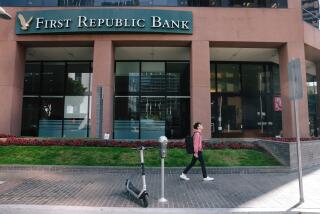Citigroup takes heat following earnings picture
- Share via
NEW YORK — Citigroup Inc.’s report Monday of a 57% drop in third-quarter profit didn’t surprise anyone. What did sound some alarms was the biggest U.S. bank’s somber take on current conditions -- suggesting that a hoped-for industry rebound may not come so easily.
Investors responded by sending Citigroup’s stock down more than 3%, and analysts made it clear that shareholders’ displeasure with Chairman and Chief Executive Charles Prince was escalating.
Citigroup took mortgage-backed security losses of $1.56 billion in the third quarter, more than the bank estimated two weeks ago, because home loan delinquencies accelerated in September, Chief Financial Officer Gary Crittenden said. And with consumer credit continuing to deteriorate, the bank’s $2.24-billion boost in loan-loss provisions was also higher than previously estimated.
Although Prince said Oct. 1 that he foresaw a more “normal” profit environment in the fourth quarter, Citigroup’s comments Monday were not quite as upbeat. Crittenden said in a conference call with analysts that parts of the company’s fixed-income holdings had weakened.
“We are not optimistic they will regain a foothold in the market,” Crittenden said.
In the third quarter, worries about bad loans caused the credit markets to freeze up. The Federal Reserve lowered interest rates and helped loosen up the markets, but they’re nowhere near as liquid as they were earlier this year. Citigroup, JPMorgan Chase & Co. and Bank of America Corp. confirmed Monday they were joining forces to buy assets that lost value in the market for mortgage-backed securities.
Citigroup’s net income fell to $2.38 billion, or 47 cents a share, in the July to September period, from $5.51 billion, or $1.10, a year earlier. Revenue rose 6% to $22.66 billion.
The results included a $729-million pretax gain from the sale of shares of Redecard, a company that signs up merchants in Brazil for MasterCard Inc.
Excluding the Redecard gain and acquisitions, Citigroup’s revenue fell 3% to $20.8 billion. That’s below the revenue forecast by Thomson Financial of earnings of 44 cents a share and revenue of $21.76 billion.
Citigroup’s shares fell $1.63, or 3.4%, to $46.24. That’s down more than 10% since the start of July, and more than 16% year-to-date. Officials said there would be no stock buybacks until the ratio of capital to risk-weighted assets improved, which probably wouldn’t be until early 2008.
Prince called the third quarter “disappointing.”
“We’re working very hard on the areas that need improvement,” Prince said during the conference call.
Disappointment among shareholders over Prince’s leadership, which has been brewing for a few years now, appears to be growing.
“The bottom line here is almost all the investors that I talk with feel like there needs to be more significant changes in terms of management,” Deutsche Bank analyst Mike Mayo said during the call, after noting that investment banking was not Citigroup’s only weak point last quarter.
Mayo pointed to risk management issues, and the likelihood of expenses outpacing revenue this year. Citigroup’s third-quarter operating expenses rose 22%.
Prince responded that several of Citigroup’s businesses have been improving. Citigroup’s global wealth-management revenue rose 41% in the third quarter, fueled by a 42% increase in international revenue and a 24% jump to record revenue at the company’s Smith Barney unit. Global consumer revenue rose 14% after a 35% rise in international consumer revenue.
“A fair-minded person would say the strategic plan is working,” Prince said.
As in previous quarters, the bank’s international businesses -- with the exception of its lagging Japan consumer finance unit -- performed better than stateside operations. U.S. consumer revenue was flat after increases in retail operations and consumer lending offset decreases in U.S. cards and commercial businesses.
Markets and banking revenue fell 24% despite a 7% international revenue gain. In addition to the $1.56 billion in mortgage-related losses, the segment suffered a $1.35-billion write-down on highly leveraged debt tied to corporate deals and $636 million in fixed-income credit trading losses.
Credit costs rose $2.98 billion. Revenue in alternative investments fell 63%.
More to Read
Inside the business of entertainment
The Wide Shot brings you news, analysis and insights on everything from streaming wars to production — and what it all means for the future.
You may occasionally receive promotional content from the Los Angeles Times.










